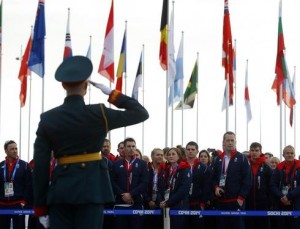
Feb 06 2014, 10:59 AM EST –
By Julian Linden
SOCHI, Russia (Reuters) – The winter wonderland Russian officials had promised the sporting world burst into life on Thursday as the first events of the Sochi Olympics got underway on the eve of the opening ceremony.
The doom and gloom that has shrouded the lead-up to the Games was momentarily forgotten as athletes reclaimed the spotlight from politicians on a picture-perfect winter’s day.
In the Caucasus Mountains high above Sochi, the world’s best snowboarders took off, unveiling all their mesmerizing, daredevil tricks against the backdrop of a brilliant blue sky and golden sun, the first time for 30 years that Winter Olympic action had taken place ahead of the opening ceremony.
Nearby, alpine skiers hit the piste at Rosa Khutor, charging down the snowy mountain without a care in the world.
Down at the Black Sea resort where the ice events are being staged, competitors were getting ready for the first figure skating events, as excitement in Sochi built.
If recent history is any guide, the pessimism that has engulfed the Games during the lead-up will quickly melt and the Sochi Olympics may come to be remembered as a stunning success.
The build-up to almost all recent Olympics has been marred by controversy and scandal but the power of sport has invariably won through.
PREMATURE PREDICTION
Four years ago, on the eve of the last Winter Olympics in Vancouver, the Games were being described as the worst ever.
The Canadian and Olympic flags had been lowered to half-mast after the death of Georgian luger Nodar Kumaritashvili, who was killed after slamming into a steel pillar during a practice run.
His grisly death raised concerns about the safety of the track at the Whistler Sliding Centre and forced officials to modify the lightning-fast course which competitors had warned was too dangerous.
The fatality only added to an already bleak atmosphere in British Colombia, where an unusually warm winter had resulted in a shortage of snow.
At Cypress Mountain, the venue for the freestyle events, officials used helicopters and trucks to dump snow on the course just to allow competition to proceed as planned.
It could not have been a worse start for Vancouver, yet two weeks later the Games ended in a wave of euphoria, and were deemed to be among the best ever.
Similarly, at the last Summer Olympics, in London in 2012, years of negativity and self-doubt magically gave way to a new era of hope and glory in the English capital.
LONDON TRIUMPH
Just days before the opening ceremony, construction workers were still scrambling to get everything ready in time while an embarrassing last-minute security blunder forced the government to deploy thousands of extra troops to protect the Games.
British soldiers were hastily called in after the private security firm that had been hired to police the games revealed that it couldn’t supply all the guards it had promised.
Yet like Vancouver, the Games were ultimately hailed as a masterful triumph.
It is a pattern that has been repeated for decades, all over the world, from debt-ridden Athens to smog-filled Beijing.
The build-up to Sochi has been dogged by concerns about security as well as rows over Russia’s anti-gay propaganda laws, allegations of corruption and massive cost overruns.
Russian President Vladimir Putin has staked his personal reputation on the success of the Games but for the athletes, the Games are all about the competition.
Bode Miller, the outspoken American skier competing at his fifth Olympics, gave Sochi a ringing endorsement, saying it had exceeded all his expectations.
“It’s great. It really has been awesome so far,” he said.
“I felt like that’s how it was going to be but after a lot of kind of negativity and a lot of speculation about what the challenges were going to be here… so far for us it’s been great.”
While the preliminary competitions began in earnest on Thursday, the athletes will get a day off on Friday as the focus turns to the opening ceremony.
More than 40 heads of state, including Putin, will attend the ceremony while a record 87 countries will be represented by athletes, plus India, whose competitors will compete under the Olympic flag because India is currently suspended by the International Olympic Committee.
The details of the ceremony always remain a closely guarded secret, especially the identity of the person who will light the Olympic cauldron, which will be televised live to a worldwide audience.
The first medals of the Games will be decided on Saturday with five golds up for grabs in biathlon, cross country skiing, freestyle skiing, snowboarding and speedskating.
The first medal that will be decided will be the men’s slopestyle, one of the newer, progressive sports on the Olympic Winter program.
The event, in which competitors perform gravity-defying stunts as they snowboard their way down an obstacle course full of jumps and rails, has already been robbed of its star attraction after Shaun White withdrew.
The American announced on Wednesday that he was pulling out because he was concerned about his safety on the course after falling in practice and hurting his wrist.
He said he would still compete in the halfpipe, which he won at the two previous Olympics, in what looms as one of the most eagerly anticipated events of the February 7-23 Games.
In keeping with recent tradition, the final medal that will be decided will be in the men’s ice hockey competition, one of the iconic events of the Winter Olympics.
The Soviet Union won the gold medal seven times between 1956 and 1988 then as the Unified Team in 1992 after the break-up.
But Russia has never won the gold as a separate federation and a victory in Sochi could be the perfect present for a host nation intent on proving the doubters wrong.








